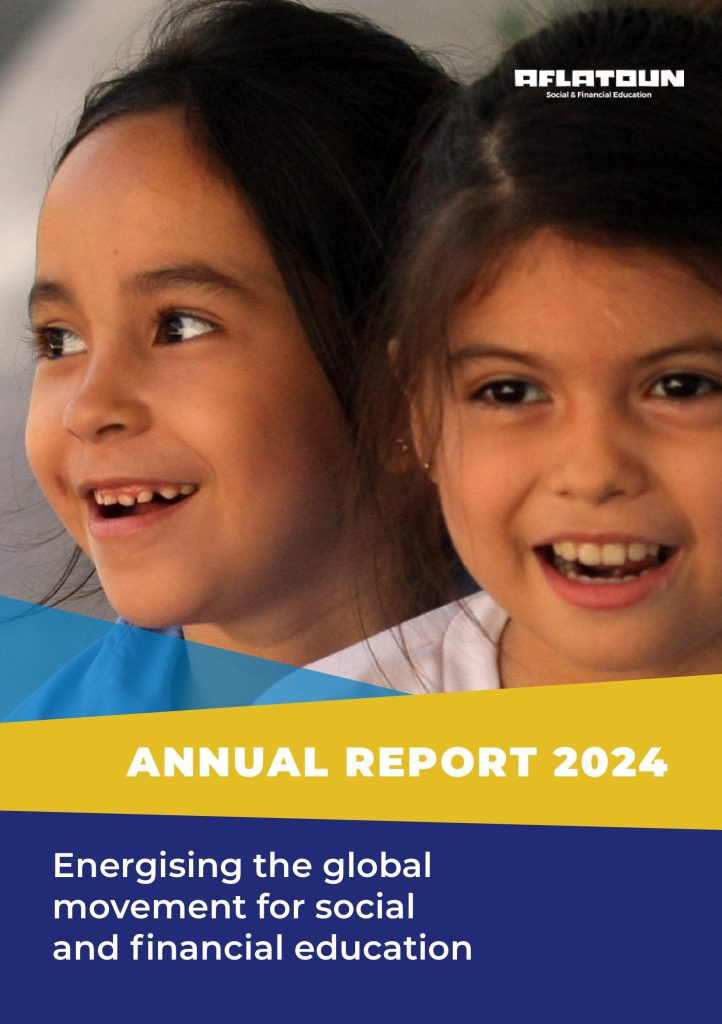Injaz has been operating in Jordan for the past 24 years to inspire and prepare youth to become productive members of society and accelerate the development of the national economy through contributing to the advancement of the education and entrepreneurship ecosystems.
The organisation focuses on financial literacy; entrepreneurship and business skills; digital competencies; interpersonal skills.
Our Partnership
One of our oldest partners, Injaz decided to join the Aflatoun network over 12 years ago because of the strong impactful programmes which focuses on both social and financial skills. After implementing many of our curricula, they are currently specialising in the Project Management programme for young boys and girls, combining social, financial and entrepreneurship skills.
Injaz believes that social and financial education is crucial because it equips individuals with essential life skills that empower them to make informed decisions, manage their resources wisely, and contribute positively to society. In many communities, a lack of financial literacy can lead to poor money management, debt, and limited opportunities for economic mobility. By teaching people how to budget, save, invest, and understand their rights and responsibilities in society, we help create more financially responsible and socially aware citizens.
This type of education also fosters a sense of social responsibility, promoting values like empathy, cooperation, and ethical behaviour. In a broader sense, it can contribute to reducing inequality, increasing opportunities for marginalized groups, and fostering sustainable economic development.
Injaz takes immense pride in its financial education initiatives, which empower young individuals with essential skills for their future. In particular, they are proud of:
Project Management Skills for Life (PMIEF): This programme equips ninth graders with a comprehensive understanding of project management, introducing key concepts and terms while guiding participants through the theoretical steps of project establishment. It helps students identify the requirements necessary to implement projects effectively, such as managing project timelines, prioritising scopes of work, utilising available resources, calculating costs, fostering teamwork, managing risks, and solving problems that may arise during project execution. By enhancing their competencies in project management, the programme prepares students to manage their personal lives and successfully implement their own projects in the future.
Financial Education Programme: This programme focuses on imparting the knowledge, skills, attitudes, and behaviours required to make informed financial decisions and achieve financial well-being. It extends beyond markets and investments to encompass critical areas such as saving, budgeting, financial planning, and the basics of banking, enabling participants to become “financially smart.” The programme combines financial and social education to instill ethical decision-making, work ethics, and financial acumen, empowering students to make sound financial choices both in their daily lives and as adults.
Through these initiatives, the association fosters the growth of competent, self-reliant individuals ready to thrive in a dynamic world.

Creative Learning for Young Kawthar Issa
Kawthar Issa, a student at Khalda High School for Girls, shared her inspiring journey as part of the Project Management Programme implemented by Injaz in collaboration with Aflatoun. Reflecting on her experience, she described how the programme introduced her to invaluable skills that will benefit her future and encouraged her to think creatively and non-traditionally.
During the first session, Kawthar recalled the supportive atmosphere created by the volunteer facilitator, who helped her and her peers overcome initial fear and tension. This approach fostered self-confidence, encouraged participation, and created an engaging and interactive environment. Through the programme, Kawthar and her classmates learned about key concepts in project management, including the project start-up model, project charters, scope definition, and role distribution among team members.
Kawthar described the experience as enriching and transformative, providing her with practical knowledge that could serve as a foundation for developing sustainable project ideas in the future. The hands-on nature of the programme not only allowed her to gain new skills but also ignited her motivation and enthusiasm for learning more.
She expressed gratitude for the encouragement and support from her parents and teachers, who celebrated her efforts to explore a new field. This support, she noted, further boosted her confidence and determination to continue building on her newfound knowledge in project management. Kawthar’s story exemplifies the profound impact of educational programmes in shaping young minds and preparing them for future success.












